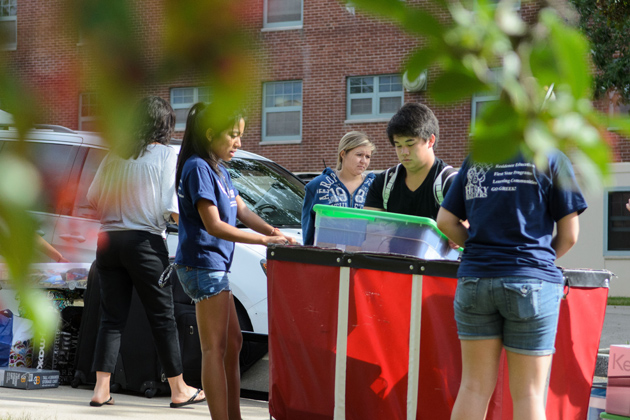[flickr-gallery id=”72157635201822392″]
To the Class of '17:
Starting college is one of the most exciting and scariest times in life. Yet it also ought to be incredibly fulfilling, and something you will look back on with fondness and pride for the rest of your life. There is a great deal you can do to help make your college experience successful and satisfying.
I have a few pointers of my own, but first I’d like to introduce you to one of our star faculty members, Mark Boyer, Board of Trustees Distinguished Professor of Political Science, who has some valuable advice to share as well:
When I arrived at a small school in Ohio more than 30 years ago, I was nervous about making new friends, about succeeding in college, and about leaving home for the first time (I was going to school more than 500 miles from home). So you should know that there are many who understand what emotions are swirling inside you right now.
But as you start this new adventure, I’d like you to ponder a quote that has shaped my thinking over the years. And at this place of extraordinary basketball success, it’s fitting that the quote comes from legendary UCLA basketball coach John Wooden:
“The team that makes the most mistakes will probably win … the truth is that a do-er makes mistakes, and mistakes come from doing – but so does success. The player who is mistake-free is also probably doing nothing to guarantee success, which is the biggest mistake of all.”
Some people we call major success stories are even bigger “failures” than we can imagine. To stay on a sports theme for a moment, ponder the following:
- A major league baseball player with a .300 batting average is likely to land in the Hall of Fame; but that means he’s failing 70 percent of the time;
- A very good three-point shooter on a basketball team has a similar failure rate;
- A Hall of Fame quarterback has a failure rate of about 40 percent on passing completions.
Focusing on some non-sports failures, here are a few more examples:
- John Grisham’s first novel was rejected by 16 agents and 12 publishing houses. He’s now one of the top-selling authors in history;
- Henry Ford’s first two automobile companies failed. But that didn’t stop him from eventually creating the Ford Motor Co. and being the first to apply assembly line manufacturing techniques to produce affordable automobiles;
- Early in her career, Oprah Winfrey was fired from her job as a reporter because she was deemed “unfit for television.”
So as you begin your college career and start to think about life after college, don’t be afraid to take some chances. Don’t be afraid to fail.
The one thing that all these stories have in common is that these people have a relentless drive to succeed. They focus on their successes and learn from their failures.
If in the coming months, the major you thought you’d love turns out to be deadly boring, try something else; with any luck at all, you’ll find something you enjoy and that you’re good at (a great combination).
If you don’t find just the right group of friends quickly enough, join a club, play intramurals, or move to a Learning Community with some like-minded students.
And if you fail at one thing, keep looking ahead and try again. When I look around at the most successful people I know, it’s not that they are necessarily smarter than anyone else. Their success is more about persistence and the willingness to accept failure and learn from it. So keep battling for what you want and where you want to go.
Professor Boyer’s words of wisdom are sure to serve you well as you start your adventure here at UConn. In addition, I would like to pass along to you three suggestions of my own:
1. Get to know at least three professors well. Immerse yourself in their classes, engage them, visit them during their office hours, talk to them. We professors are just regular people, and we want you to visit us and ask for feedback. Professors can help you not only during your time in school, but throughout your life: recommending you to others, giving good advice, and helping to guide you along the way – whatever career path you choose.
2. Learn how to manage your time. This is an incredibly valuable skill. It prevents you from feeling overwhelmed; it helps you to meet deadlines – and it also ensures that you have time to have fun or relax without neglecting your obligations. Learn how to estimate how long something will take. Make plans and stick to them. Write things down, and make lists to help you get things done. Draw them up daily, and keep them close. I do it myself – I began during my freshman year in college, and still live by making lists of what I have to do.
3. While you’re here, join as many things as you can – while of course keeping an eye on the time management piece of advice. Life at a university is focused on academics, and rightly so. But there’s so much more to it. Becoming a part of something and getting to know a lot of other people – whether it’s sports, an academic society, student government, a cultural center, making art and music, or Greek life – helps ensure that you will have a fun, well-rounded experience in college.
With that, we wish you all the best for the coming academic year.
Susan Herbst
President, University of Connecticut



